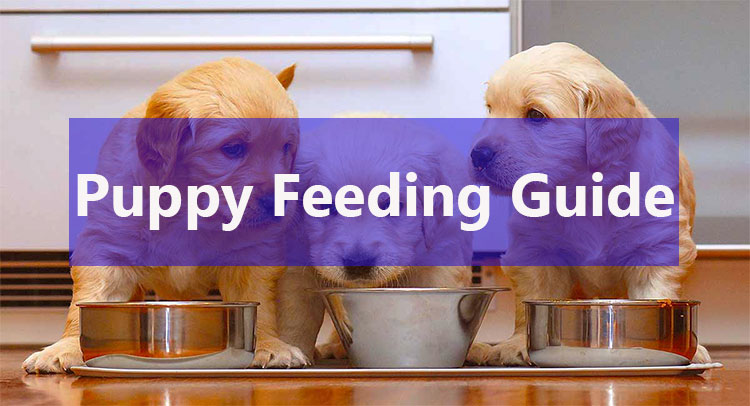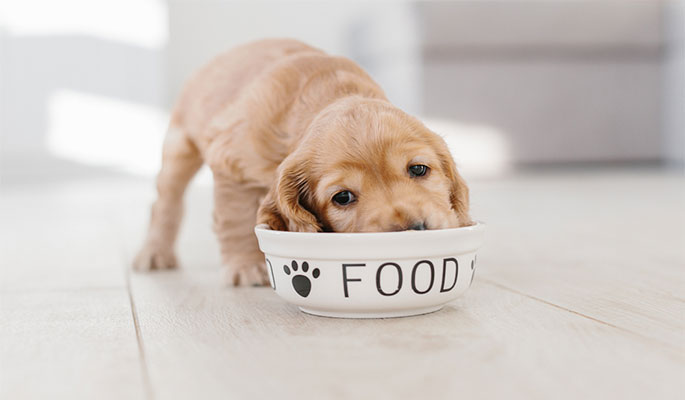
Puppies grow up fast, but this doesn’t mean you can give them an endless amount of food just because they always seem to be begging for more.
Young pups have small tummies, which makes it crucial for pet parents to avoid overfeeding them. Puppies need enough energy for play and learning, but feeding them a lot doesn’t always guarantee good nutrition.
To ensure that you’re feeding your puppies the right food at suitable times throughout their growth and development, let the tips below serve as your guide:
Feeding Guide for Labrador Puppy
Labrador Retrievers are one of the most popular dog breeds due to their friendly nature, intelligence, and boundless energy. Proper nutrition is crucial for their growth and development, especially during the puppy stage. This guide will help you understand the best feeding practices to ensure your Labrador puppy grows into a healthy and happy adult dog.
Understanding Your Labrador Puppy’s Nutritional Needs
- Growth and Development: Labrador puppies grow rapidly during their first year. They require a balanced diet rich in proteins, fats, vitamins, and minerals to support muscle development, bone growth, and overall health.
- Caloric Requirements: The caloric needs of a Labrador puppy will vary based on their age, weight, and activity level. Puppies generally need more calories than adult dogs due to their rapid growth and higher energy expenditure.
Choosing the Right Food
- Commercial Puppy Food: Look for high-quality puppy food formulated specifically for large breeds. These formulations help control growth rates and support joint health, which is critical for Labradors.
- Ingredients to Look For:
- Proteins: Ensure the food has a high protein content from sources like chicken, lamb, or fish.
- Fats: Healthy fats are essential for energy and coat health. Look for foods with omega-3 and omega-6 fatty acids.
- Carbohydrates: Whole grains like brown rice or oats provide necessary energy and fiber.
- Vitamins and Minerals: Ensure the food contains essential vitamins and minerals like calcium, phosphorus, and DHA for brain development.
Feeding Schedule
- 8-12 Weeks: At this stage, puppies should be fed four times a day. Their meals should be evenly spaced throughout the day to keep their energy levels stable.
- 3-6 Months: Reduce feeding to three times a day. Monitor your puppy’s weight and adjust portion sizes as needed.
- 6-12 Months: Transition to two meals a day. By this age, your puppy’s growth rate will start to slow, and their caloric needs will decrease slightly.
- 12 Months and Beyond: Once your Labrador reaches adulthood, you can continue with two meals a day, adjusting portions based on their activity level and weight.
Portion Sizes
- Following Package Guidelines: Start with the feeding guidelines provided on the puppy food packaging. These recommendations are typically based on your puppy’s weight and age.
- Adjusting Portions: Monitor your puppy’s weight and body condition. If your puppy is gaining too much weight, reduce the portion size slightly. If they seem too thin, increase the amount of food.
Transitioning to Adult Food
- When to Transition: Around 12 months of age, you can start transitioning your Labrador from puppy food to adult food. Large breed formulas are ideal for adult Labradors.
- How to Transition: Gradually mix the new adult food with the puppy food over a week to avoid digestive upset. Start with 75% puppy food and 25% adult food, then slowly increase the adult food proportion.
Treats and Supplements
- Healthy Treats: Use treats sparingly and choose healthy options like small pieces of fruit, vegetables, or commercial dog treats designed for puppies.
- Avoid Overfeeding Treats: Treats should not make up more than 10% of your puppy’s daily caloric intake.
- Supplements: Generally, if you are feeding a balanced commercial diet, additional supplements are unnecessary. Consult your veterinarian before adding any supplements to your puppy’s diet.
Common Feeding Mistakes
- Overfeeding: Labrador puppies are prone to obesity. Avoid overfeeding and stick to recommended portion sizes.
- Feeding Table Scraps: Human food can be harmful to dogs and lead to weight gain and nutritional imbalances. Stick to dog food and dog-safe treats.
- Inconsistent Feeding Schedule: Keep a consistent feeding schedule to maintain your puppy’s energy levels and digestive health.
Monitoring Your Puppy’s Health
- Regular Vet Check-ups: Schedule regular veterinary check-ups to monitor your puppy’s growth and health.
- Body Condition Scoring: Learn to assess your puppy’s body condition. You should be able to feel their ribs without pressing too hard, and they should have a visible waistline.
- Adjusting Diet as Needed: Based on your puppy’s growth and health, adjust their diet as recommended by your veterinarian.
Conclusion
Proper nutrition is vital for the healthy growth and development of your Labrador puppy. By following a well-structured feeding schedule, choosing high-quality food, and paying attention to portion sizes, you can ensure your puppy gets the nutrients they need. Remember to adjust feeding practices as your puppy grows, transitioning from multiple meals a day to a more stable adult diet. Limiting treats and avoiding harmful foods are also crucial steps in maintaining your puppy’s health. Always consult with your veterinarian for personalized advice to support your Labrador puppy’s journey to becoming a happy, healthy adult dog.




Thank you for this beautiful article.